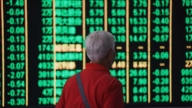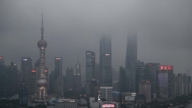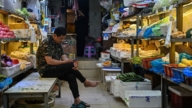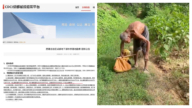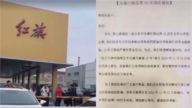【新唐人2013年11月02日讯】截至10月27号,四大银行存款下降1.29万亿,股市资金也流出上千亿元,央行重新启动暂停了两周的逆回购操作,不过,130亿的地量逆回购,也没有解决资金流动性困境,银行间隔夜同业拆放利率突破5%关口至5.23%,7天同业隔夜拆借利率逼近5.6%。国债需求平淡,钱荒之声再起。钱到哪里去了?我们看看专家怎么说。
据《上海证券报》10月31号报导,消息人士透露,工商银行、建设银行、中国银行、农业银行存款持续流出的趋势仍未得到改善,截至10月27号,27天内四大银行存款流失1.29万亿元,较上一周持续流失2800亿元。
大陆金融投资顾问郑先生:“银行的风险不就是把钱派给了国企、央企和地方政府的各类融资金牌吗,金监会、银监会一看,到国务院一看,然后什么都不说了,银行自己成立一个资产处理公司,把这些呆账坏账进行打包,再拍卖给国家,造成的损失当然全民买单,通货膨胀。”
存款下降,贷款却没有相应增加。截至10月27号,四大银行新增贷款仅为930亿元。
那么,存款去哪里了呢?
大陆金融分析师任中道:“经过分析,它没有流入到实体经济,比如它的贷款只有930亿元,那跟1.2万亿是非常大的一个差别,我的看法,它资金外逃出来了,不可能这钱的存款出来了,都在手里揣着吧。”
同时,资金面紧张导致新发国债招标遇冷。10月30号,中共财政部发行1年期固定利率国债,中标利率为4.01%,高出此前预测中标利率区间的3.74%—3.90%,但需求还是平淡。
由于担忧钱荒,黄金市场也出现恐慌现象。10月30号,中国黄金收盘价,今年来首次低于全球金价。
另外,股市资金也在持续流出,据上海万得公司(Wind资讯)数据,在9月2号至10月16号的26个交易日中,全部A股资金净流出总额为1597.42亿元,日均资金净流出额为61.44亿元。
任中道:“主要现在各种资金都在加速逃离中国,外汇也好,甚至通过各种贸易,地下钱庄,一些投资者也认为,现在中国经济不是很好,危机可能也要到来,他们从股市、从黄金都是在抛售,把现金收回来。”
“建行”最新公布的三季度报告显示,“建行”3季度末,“向中共央行借款”由年初62.8亿元飙升到2224.3亿元,增幅高达3441%。这一点在其他三家大行身上也有所体现。
这代表中共央行以低于同期限的“上海银行间同业拆放利率(The Shanghai Interbank Offered Rate, Shibor)”几十个点的价格,将资金出借给大型商业银行,大型银行作为市场稳定器,再转拆借给其他商业银行,从中赚取差价。
任中道:“以房地产做例子,房地产弄不到钱怎么办,它就找信托公司,说我给你15%的利息,你帮我找贷款,信托公司找银行,说我给你10%的利息,你帮我做理财产品,银行做了个包装,取个名头,然后给老百姓说,我给你5%的利息,线路图是很明显的,最后全落在了老百姓身上。”
据上海《第一财经日报》11月1号报导,日前宁波理财产品6亿募资失踪,其中有宁波银行闵行支行客户经理介入,以“上海市闵行区动迁安置房项目二期D款”的产品,向客户募资。一对老年夫妇100万血汗钱不能兑现,老年夫妇如坐针毡。
郑先生:“银行业早就开始在逐步的转嫁风险,理财产品的增加,其实就是银行转嫁风险的一种方式,其实还是从银行把钱搞走了。”
10月29号,国务院发展研究中心主任李伟在“世界工商协会论坛”上表示,三、四线城市出现泡沫破裂现象。
大陆金融投资顾问郑先生指出,银行业把百姓的辛辛苦苦赚来的一点存款,贷给有钱人赚钱,房地产一旦泡沫破裂,中共央行再大量印制钞票,来维持稳定,最后通货膨胀的风险还是转嫁在老百姓身上。
采访编辑/刘惠 后制/孙宁
Where Did 1.3 Trillion Go?
Sources say that China´s big four banks have seen
a 1.29 trillion yuan negative deposit as of Oct. 27.
Several hundreds of billions of stocks flowed out.
China´s Central Bank restarted the reverse purchase
operation (repo) after having ceased it for two weeks.
However, 13 billion yuan injected into the system still
couldn´t resolve the cash shortage crisis.
The repo rate increased from 5% to 5.23%.
Within seven days the repo rate approached 5.6%.
National bonds were in less demand,
resulting in a cash shortage reoccurrance.
Some people questioned, “where does the money go?”
Let´s take a look.
On October 31, “Shanghai Securities News”
reported information from a reliable source.
Industrial and Commercial Bank, Construction Bank,
Bank of China and Agricultural Bank deposits had
continuing outflow, and the trend hasn´t improved.
As of October 27, these four big banks saw a 1.29 trillion
yuan in outflow of deposits during October alone.
280 billion yuan has flowed out compared to last week.
Mr. Zheng, Chinese financial investment consultant:
“The cause of the credit crunch is that the banks lent money
to the state-owned enterprises and the local governments.
Once the Financial Supervisory Commission went to the State
Council (chasing payment), they dared not to speak anymore.
Thus the banks have to set up their own asset management
company to put these companies who owe them money
in an auction, selling them to the state.
Finally, the loss certainly will be paid by civilians,
which can also cause inflation.”
The deposits dragged down, but loads didn´t increase.
Sources say the big four banks extended only 93 billion yuan
in new loans as of Oct. 27.
Nevertheless, where is the money?
Ren Zhongdao, Chinese financial analyst: “The analysis
shows the money didn´t flow into the economy.
For example, there are only 93 billion yuan in loans.
Compared with 1.2 trillion, that is a big difference.
I believe that the money has flowed out,
it is impossible to withdraw the cash
and hold it in their hands.”
Meanwhile, the cash shortage caused less demands for newly
issued national bonds.
On Oct. 30, the Financial Ministry issued national bonds
with a one-year fixed rate of 4.01%, which
is higher than the estimated of 3.74% – 3.9%.
But not many people are buying it.
As the money shortage is worrying many,
the gold market appears to be in a panic.
On Oct. 30, the Chinese gold closing price was below
the global price for the first time this year.
In addition, stocks are constantly flowing out.
Shanghai Wind Information statistics shows that
from September 2 to October 16,
160 billion A-shares have flowed out.
The daily outflow is 6.2 billion yuan.
Ren Zhongdao: “Various funds accelerate flowing out China,
including foreign currency, fleeing through a variety
of trade channels and underground banks.
Even some investors say that the current Chinese economy
is not very good, the crisis is on its way.
Thus people are cashing out their shares and gold.”
China Construction Bank´s Quarter 3 report shows,
at end of Q3, the Construction bank borrowed loans
from Central Bank, and it increased from 6.28 at early
this year to 222.43 billion yuan by now.
It has increased 3441%.
This phenomenon also occurred at the three other big banks.
China´s Central Bank lent money to big commercial banks
at a lower rate than the Shanghai Interbank offered rate.
The commercial banks re-lent the loans to the other
commercial banks to make a profit.
Ren Zhongdao: “We´ll take real estate as example.
If the real estate companies can´t get a loan from the banks,
they approach the trust companies, telling the trust companies
that they can pay a 10% interest rate and let the trust company
handle their funds.
Then the trust companies create a package telling the public
that they can offer 5% interests rate.
In the end, the people pay the bill.”
On November 1, Shanghai´s China Business News newspaper
reported that 600 million yuan is missing
at a fundraising company in Ningbo.
A manager at a branch of Ningbo Bank was involved
in the event.
He fundraised the money from clients for a project.
An elderly couple injected one million yuan of hard-earned
money but in the end they can´t cash it in.
They are so worried.
Mr. Zheng: “The bank sectors are gradually transferring risk.
The increasing fundraiser products are the way
the banks transfer the risk.
Actually, the money was transferred
to somewhere else from the banks.”
On Oct. 29, Li Wei, director of the State Council
Development Research Center, spoke in a forum.
Li said that the bubble burst phenomenon
appeared in third and fourth-tier cities.
Financial investment consultant Mr. Zheng says that the banks
lend people´s hard-earned savings to the rich to make money.
Once the housing bubble burst, the Central Bank
will issue more bank notes to maintain the stability.
Finally, the inflation risk will be loaded on civilians´ shoulders.



